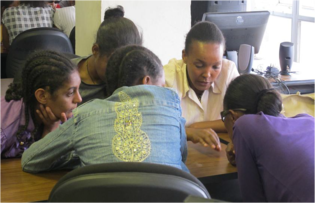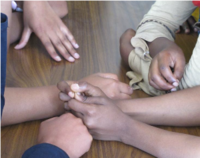Workshop with Females with Disabilities
May 31st 2014
8.30 am to 4.00 pm
Special Needs Education Department
AAU
Program:
| Registration | 08:30-09:00 |
| Self Introduction | 09:00-09:15 |
| Introduction | 09:15-09:30 |
| Opening | 09:30-09:45 |
| Brainstorming | 09:45-10:30 |
| Tea Break | 10:30-11:00 |
| Cultural and Social Issues related to Female with Disability (group discussion; 5 groups) | 11:00-11:30 |
| Discussion | 11:30-12:30 |
| Lunch | 12:30-01:30 |
| Teaching and Learning in Higher Education (group discussion; 5 groups) | 01:30-02:00 |
| Discussion | 02:00-03:00 |
| Tea Break | 03:00-03:10 |
| Economic Issues related to Female with Disability | 03:10-03:40 |
| Wrap up and Closing | 03:40-04:00 |
Number of participants: 25 female students with disabilities (VI, PI)
Staff members:
Yirgashewa Bekele Abdi, MA (AAU)
Mag.a Michelle Proyer (UV)
Initially, the students were invited to share their immediate thoughts on challenges related to higher education they have to face as females with disabilities during a brainstorming. After that the (group and plenary) discussions were focusing around the following topics:
- Social and cultural issues (including religious and community perception of females with disabilities)
- Teaching and learning (including teachers' perceptions of female students with disabilities, availablitiy of resources relevant to learning)
- Economic issues in relation to educational success

- Pictures were taken with the consent auf the students.
Community
- Controversial issue: Some of the students indicate that the communities' level of education matters in regard to attitudes towards education of females with disabilities whereas others said the opposite.
- Some students report that their communities influenced their families not to send them to get education. So despite the families' support, the community was against their education This changed the families' decision on sending their daughters with disabilities to school. Many of the females did go without their families' permission. Currently, some even do not have any relationship with their parents.
- Most participants report that there were certain people, either relatives (e. g. mother, uncle, etc.), neighbors or teachers who supported them in their struggle to receive good education.
Religion
- The community does not expect females with disabilities to attend religious ceremonies at church because they perceive that it is not necessary to be religious when you are disabled. One participant reported that she was told: "Why do you go to church after all? God will not punish you anymore."
- Others reported that people at church believe that they are beggars and they are given money without even being asked. The ones giving them money believe that even a small donation (5 Ehtiopian Cents) to a person with disability will bring them closer to heaven.

Teaching and Learning
- It was reported that high school and primary school were very supportive compared to university and they started to realize that they are disabled only after they attended university.
- Apparently, the extent of service in relation to access to Braille materials and reading notes defers from department to department. However the students commonly share the absence of updated Braille printed books and inconvenient exam conditions (e.g. exams with pictures, blind students have to take exams in corridors, etc.).
- Many of the female students report that their teachers have low expectations. Sometimes they believe that their achievements in exams are due to the support of the readers (students are expected to bring and pay other students who read exam questions to them).
- A number of students told stories about having problems with administrative staff of the university.
- Sometimes they are not informed about changes in schedules or exam times as there is no notification issued in Braille.
Economic Issues
- Students receive 120 BIRR per month from the university. This money does not even cover costs for exam readers and duplication of handouts.
- Even the families do not support their expenses as they would for their nondisabled children.
Additional Issues raised
The group was discussing the issue of dormitories at university. Students with disabilities are separated from those without disabilities and according to the kind of disability. The opinion on this circumstance is mixed. The explanation of the administration (separating those with disabilities from those without in order to prevent theft) was discussed.
The organizers are very happy with the high level of participation and engagement of the female students with disabilities.
We would like to thank all the participants and will be working on further publications to disseminate the issues indicated above and others more in order to enable sustainable change for females with disabilities attending higher education in Ethiopia.
Department of Education
University of Vienna
Sensengasse 3a
1090 Vienna
Austria
T: +43-1-4277-468 01
F: +43-1-4277-468 09





